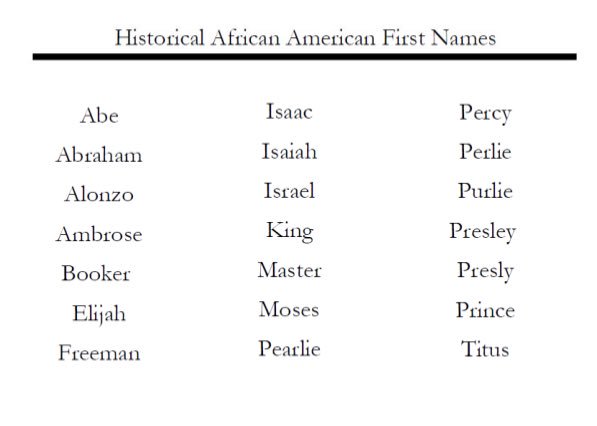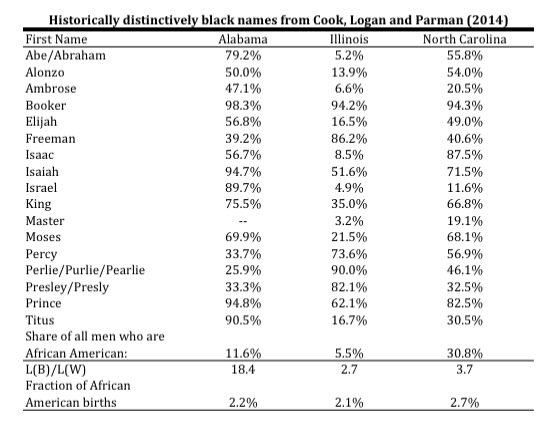A thread on something we rarely talk about (except as a potential limitation): external confirmation of results. The number to remember here is 2.5%
When @drlisadcook and @jmparman and I were working on historical black names we faced several problems. First, nobody ever said that there were black names historically. All of the literature says that black names began after the Civil Rights Movement.
There are some famous papers which use black names to uncover discrimination in the labor market, for example, and other works that finds no effects to having a black name.
But is the narrative about names the correct one?
But is the narrative about names the correct one?
It’s hard to know. There might be historical black names, but how do we find them? @drlisadcook had the idea to use Census records to find high frequency black names that were disproportionately held by blacks. (This is very clever!)
The problem was that all of these names may be a figment of census error, problems of recording names, or effects that would be spurious. We know coverage of blacks people in the census is poor, so we were hesitant to say that this was the be all end all.
This is where @jmparman and I used a different data source— death certificates. We had death records from IL, AL, and NC. Our idea was that if the census was indeed correct the black names would be just as disproportionate in this independent data source.
We verified @drlisadcook census results! We found that around 2.5% of Black men indeed had one of these black names. (About the same percentage today who have black names, but not me that today’s names are TOTALLY different!)
But even more, this pattern across different states tells us that this is a national trend, not something driven by one region. It’s now much more likely that we found a national pattern.
Indeed, the pattern is quite stable. And for something like a naming pattern you’d need that to be the case.
After we published the first paper we added the death records of MO and we found that those name had the same disproportionality as the names from IL, NC, and AL. It was yet another external confirmation of our results!
And now, Jon Pritchett has found that 2.5% of male slaves sold in New Orleans had one of the names we identified! This is not only confirmation, but tells us that the naming pattern may have started in chattel bondage.
Why is this important? Well, there are two reasons. First, this is a MAJOR contribution to African American history. Naming patterns are traditionally seen as cultural markers. The idea that there was no naming pattern fit with a story of low autonomy among blacks.
A result like this one suggests that (perhaps before) or immediately after slavery blacks were distinguishing themselves by a naming pattern. It didn’t start with a cultural awareness birthed from the Civil Rights Movement. It’s been there all along.
Second, it’s important because it shows that persistent patterns, by themselves, are evidence. It’s really important to note that we’re not talking about a causal question but an existence question. And this existence question is tied to fundamental aspects of black culture.
One thing that really disappointed us was that social scientists always wanted us to link the names to a result. That’s the wrong frame to think about what we did. We found something in black history which we were told would not and should not be there!
The simple existence of these names changes the narrative about black names entirely. It doesn’t matter if the names themselves mattered, it matters that the names existed at all.
And that we find this ~ 2.5% consistently across different data types with different errors and biases tells us something new about black people and our history. I’m most surprised by the antebellum results. They raise a whole new series of questions.
The narrative about black names needs to take into account this fact. So the question is not about black names being new (they were not!) but why did they change? And this is a deep, important, question for cultural historians to work on. And it started with external confirmation

 Read on Twitter
Read on Twitter







